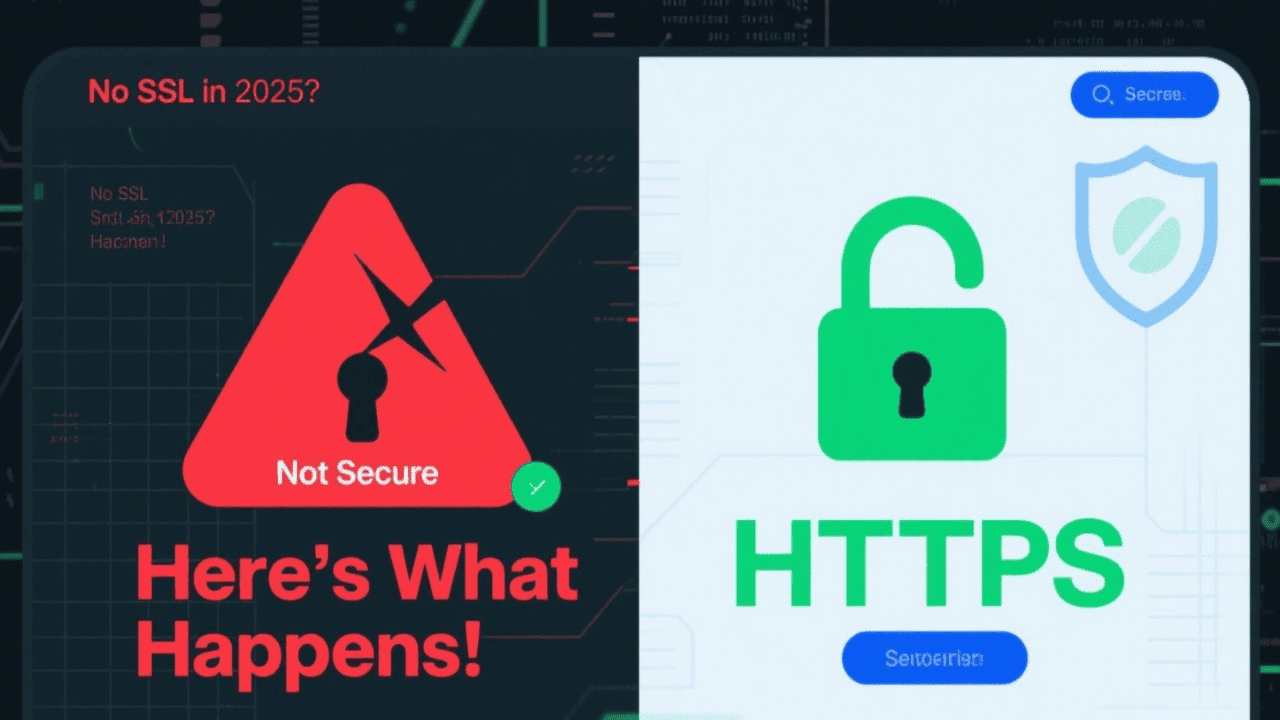By 2025, operating a website without a SSL certificate could pose a significant cybersecurity risk, especially as the need for robust website protection continues to grow. Even if you’re using budget hosting or a low-cost VPS, your site remains vulnerable without proper SSL encryption. SSL certificate are essential for protecting sensitive user data, such as login information, payment details, and private communications, from threats like interception and data theft. Without this security layer, your website becomes an easy target for cyberattacks. Enhance your site’s credibility and user trust by securing it with a reliable SSL certificate.
Why SSL Certificate Are Essential for Website Protection
By 2025, overlooking the need for an SSL certificate isn’t just a small mistake, it’s a major security liability. Although awareness about website protection is growing, many website owners still fail to recognize how crucial SSL encryption is for safeguarding their platforms. Some view it as too technical or unnecessary for smaller sites, but this assumption is risky. If your website handles transactions, business operations, or collects sensitive user information, having an SSL certificate is non-negotiable. Without it, your site is exposed to cyber threats, eroding user trust and increasing the risk of data breaches. In the modern digital landscape, SSL isn’t optional, it’s a foundational element of secure and reliable website protection.
Why Not Using a SSL Certificate Is a Major Risk in 2025
Still questioning the importance of an SSL certificate for your website in 2025? The reality is clear, SSL is absolutely essential. Without it, your site is exposed to serious cybersecurity threats that can jeopardize sensitive data, disrupt business continuity, and damage user confidence. Ignoring SSL implementation doesn’t just increase risk, it can harm your online credibility and brand reputation. In this section, we’ll break down the key risks of operating a website without SSL encryption and explain why it’s a critical component of website protection today.
1. Unencrypted Data Becomes Easy Target for Cybercriminals
Operating a website without SSL in 2025 leaves sensitive user information dangerously unprotected. When personal info is transmitted without encryption, it becomes vulnerable to interception by malicious actors. This not only endangers your users but also compromises your business integrity. Implementing SSL encryption is a critical step in securing your website and maintaining user confidence.
2. Increased Risk of Man-in-the-Middle (MitM) Attacks
In 2025, websites lacking SSL encryption are prime targets for man-in-the-middle (MitM) attacks. These threats occur when cybercriminals intercept the data flow between your site and its users, allowing them to access or alter sensitive information such as login sessions, payment data, and email addresses. Without SSL protection, your website offers little defense against this type of silent intrusion, putting both user privacy and business security at serious risk.
3. Increased Exposure to Phishing Threats
In 2025, lacking an SSL certificate significantly raises the chances of phishing attacks. Without HTTPS and the familiar padlock symbol, visitors may struggle to confirm a site’s authenticity. Cybercriminals often take advantage of this by creating fake copies of websites to trick users into submitting sensitive data like passwords or financial details. SSL encryption not only boosts website protection but also reinforces user trust by verifying your site’s legitimacy.
4. Legal Consequences: Non-Compliance with Data Security Regulations
Operating a website without SSL encryption in 2025 can result in significant legal repercussions. Compliance standards such as PCI DSS mandate SSL protection for sites that process payments or sensitive user data. Ignoring these requirements not only heightens the risk of data breaches. It also opens your business to regulatory penalties, fines, and legal actions. To maintain credibility and avoid costly violations, securing your website with SSL is essential.
5. Decline in User Trust and Search Engine Visibility
By 2025, operating a website without an SSL certificate poses risks beyond security. It directly impacts your site’s reputation and online presence. Leading browsers like Chrome now display warnings for sites without HTTPS, labeling them as “Not Secure,” which can immediately deter visitors. This lack of trust not only drives traffic away but also negatively affects your SEO rankings. Without SSL protection, your website may struggle to gain visibility, lose user confidence, and damage your brand credibility.
Conclusions on SSL Certificate
In 2025, neglecting to install an SSL certificate is no longer a minor oversight, it’s a critical security flaw. From exposing sensitive data to weakening SEO rankings, the dangers of running a website without SSL are far too great to ignore. SSL is not just a protective layer; it’s a trust signal for users and search engines alike. That’s why choosing a trusted SSL provider is essential.
SSL Malaysia, as a dedicated Digital Asset Protector, offers premium SSL solutions to ensure a safer and more secure online experience. From trusted SSL certificate to email signing solutions and advanced services, SSL Malaysia delivers unmatched expertise. As a Global Distribution Partner of top Certification Authorities (including DigiCert, Symantec, GeoTrust, Thawte, RapidSSL, GlobalSign, and Sectigo) SSL Malaysia focuses solely on SSL. We don’t offer web hosting, domain registration, or unrelated services, SSL is our only business, and that’s how we guarantee expert support with zero distractions.
Secure your site with confidence, whether you’re purchasing or renewing, let SSL Malaysia be your trusted partner for online protection.
👉 Contact us today and experience the difference real SSL experts can make.





